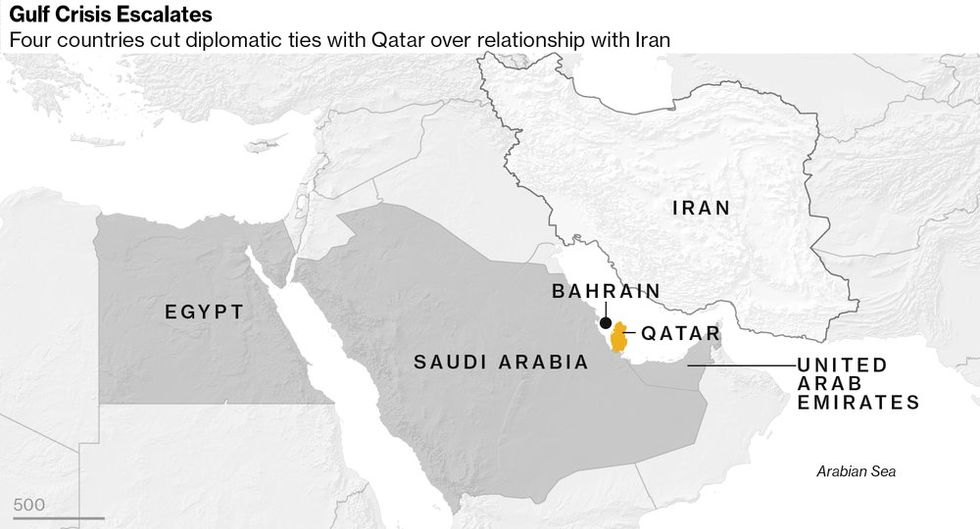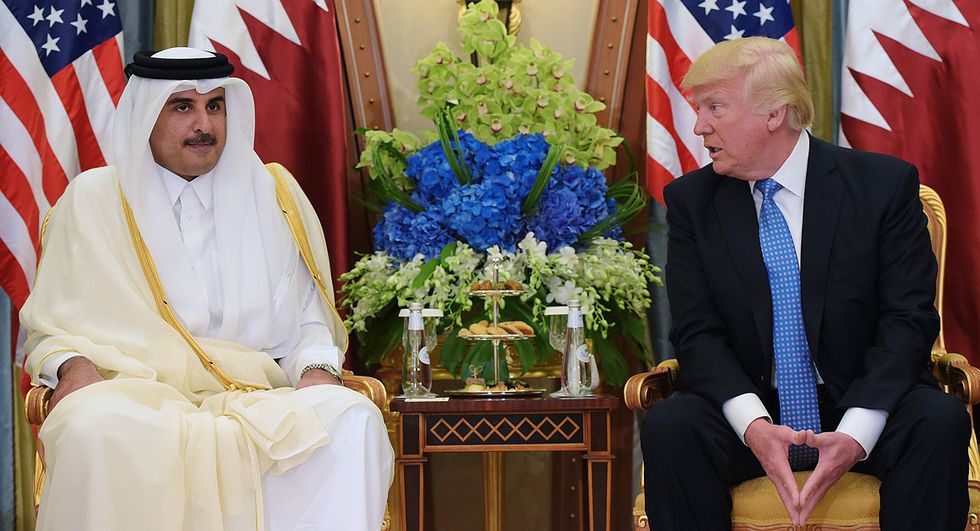There is a proxy war being waged in the Middle East over the regional balance of power. On one side are the Sunni majority countries, led by Saudi Arabia. On the other side is the kingdom’s historic rival, the Republic of Iran. The battlefield is on foreign press tours and negotiating tables and the casualty is Qatar. The weapon is President Donald Trump’s vanity. Let’s take a closer look.
On June 5, 2017, five Middle Eastern countries abruptly cut ties with Qatar: Saudi Arabia, Egypt, Bahrain, the United Arab Emirates, and Yemen. The borders surrounding tiny Qatar have since been closed off and the airspace available to Qatar Airways restricted.
Like Regina George, Qatar can't sit with them anymore
Qatar is a small peninsula on the much larger Arabian Peninsula, which effectively means that Qatar is totally isolated to the west by both land and air. At the moment, its only physical access to the world is to the east, across a restricted zone of the Persian Gulf.
This is dangerous for a country that imports over 80% of its food supply from other Arab countries. Trade with these countries has ground to a halt. Arab naval authorities have been instructed not to receive Qatari vessels. Flights that are destined for Europe, Africa, the Americas, or anywhere west of Qatar have to go in a roundabout manner through Iran. Trucks full of food and other imports remain trapped on the wrong side of the border. There are reports of Qataris making panicked supermarket trips to stockpile on food in the event of shortages.
Doha, the capital, has stressed to its nearly 2.5 million citizens that it is taking precautions. Qatar has been importing food from Iran, one of its few remaining allies in the region. The Qatari government also has a massive sovereign wealth fund of a few hundred billion dollars that can act as a defense against hard times. Moreover, because of oil and gas, Qatar is among the wealthiest countries in the world: average per capita income is well over $100,000. Qataris are not in any immediate danger of starving. Food and energy prices could skyrocket, but this is more of an inconvenience than a real threat. The true reasons for the current crisis are entirely political.
Saudi Arabia has long accused Qatar of financing terrorist groups. Organizations like the Muslim Brotherhood, Hamas, and al-Qaeda affiliates are thought to receive covert Qatari support. Qatar has also been accused of sponsoring U.S. classified terrorist groups in Syria. At the same time, however, Qatar hosts the Al-Udeid Air Base, the single largest U.S. military base in the Middle East. The base houses the U.S. Air Force stationed in the Middle East and is a headquarters of the United States Central Command, from where many of our operations in Iraq and Afghanistan are deployed. Qatar has been an invaluable friend of the United States during the War on Terror, but it also pursues interests of its own, not all of which are consistent with U.S. interests. This is common in international relations. China and the U.S. work together on a great number of issues, but China regularly commits intellectual property theft against U.S. companies. The U.S. spies on China too, so the "it's complicated" relationship is a two-way street. The same goes for Qatar. Its rulers allow our military forces to deploy anti-terrorist operations from their territory, but they also support some of those terrorist groups that we actively fight against. It is not always possible to influence how another country may act. Accomplishing a set of goals given competing interests is like walking a tightrope with a precipice on either side. This latest incident with Qatar threatens to topple all of us over.
Qatari Emir and US President; Relationship Status: It’s Complicated
Saudi Arabia is leading the campaign against Qatar, but not out of any interest to combat terrorism. Saudi Arabia itself is guilty of many of the charges it has made against Qatar. Instead, Saudi Arabia is picking on Qatar because of its warm relationship with Iran. Qatar and Iran share custody of an oil field in the Persian Gulf and Qatar regularly advocates for Iran in Arab forums and international conferences. It is quite likely they also cooperate in covertly financing terrorist operations in other parts of the Arab world.
Of all the countries in the Middle East, Iran has the greatest potential. It is fairly politically stable and has a strong and diversified economy with a large, well-educated population. It has significant oil and gas reserves, but is not overly dependent on either. By all means, it should be the hegemony of the Middle East, and most likely will be if it continues to integrate into the wider global community. Saudi Arabia is its most significant rival and Qatar’s cooperation with Iran has always been a thorn on Saudi Arabia’s side. With a new American president, Saudi Arabia is now exploiting an opportunity to put Qatar in line.
Donald Trump is a vain man with a short attention span. During his recent world tour, President Trump was wooed by Saudi Arabia. The ruling members stroked his ego and have apparently convinced him that Qatar is responsible for state-sponsored terrorism in the region. Of course, President Trump is overlooking Saudi Arabia’s own complicity in stoking terrorism in the region. Its state sanctioned sect of Islam, Wahabbism, is in many ways the inspiration for the extreme interpretation of Islam by ISIS and al-Qaeda and its affiliates have received preferential treatment from many members of the Saudi monarch. Not to mention that Saudi Arabia is leading a war in Yemen, which is itself another proxy war with Iran (you’d need another article to talk about that crisis).
Saudi Arabia gave Qatar a list of demands to end the crisis. These demands are not public, but are probably aimed to hurt Iran and make Qatar fall in line. As of Sunday, July 2, Qatar plans to formally reject this list of concessions, indicating that the current standoff will not abate. As long as Saudi Arabia remains confident that Donald Trump stays on their side, it will likely continue.























